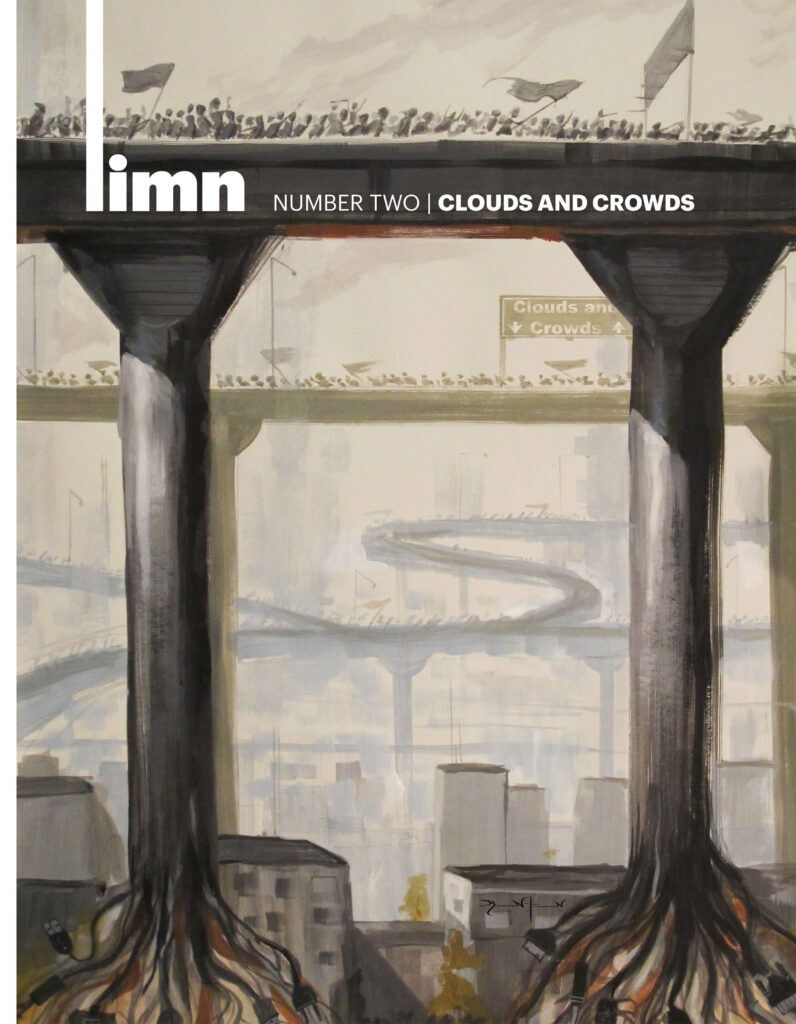
No. 2
Clouds and Crowds

This issue of Limn focuses on new social media, data mining and surveillance, crowdsourcing, cloud computing, big data, and Internet revolutions. Rather than follow the well-worn paths of argument typical today, our contributors address the problems in new ways and at odd angles: from the power and politics of statistics and algorithms to crowdsourcing’s discontents to the capriciousness of collectives in an election; from the focus group and the casino to the worlds of micro-finance and data-intensive policing. Together they raise questions about the relationship of technology and the collectives that form in and through them.
Published March 2012
In This Issue
Preface: Crowds and Clouds
This issue of Limn focuses on new social media, data mining and surveillance, crowdsourcing, cloud computing, big data, and Internet revolutions.
The Weakness of Crowds
Why can’t crowds defend themselves? Alek Felstiner explores how the power of crowds to decide is also a weakness when it comes to organizing.
The Touch-point Collective: Crowd Contouring on the Casino Floor
Women under thirty and retired men might have surprisingly similar tastes for gambling. Natasha Dow Schüll explains how casinos have created a new kind of crowd.
Crowd funding and its Challenges
Micro-lending plus crowd-sourcing creates its own problems. Roma Jhaveri explains how to keep crowds happy.
Can an Algorithm be Wrong?
How do we know if we are where it's at? Tarleton Gillespie explores the controversy over Twitter Trends and the algorithmic 'censorship' of #occupywallstreet.
Top Needs of Occupy Sites
J.R. Baldwin collects the top needs of Occupy sites across the nation.
Occupy Sourcing
Amira Pettus diagrams how Occupy recreates the structures and organization of collectives.
Art by Ruben Hickman
Painter Ruben Hickman does crowds and clouds.
Am I Anonymous?
Learning how Anonymous works means learning to be one. Gabriella Coleman narrates her experience of being in between worlds.
Engineering Collectives: Technology From the Coop
Engineers make the world, but not just as they please. Chris Csikszentmihályi recounts how engineers come to be part of one collective or another.
Romans or Barbarians? Political Campaigns and Social Media in Colombia
Elections are still about shaking hands and kissing babies, for the time being. Maria Vidart explores the first experience with social media campaigning in Colombia.
Everywhere and Nowhere: Focus Groups as All-Purpose Devices
Can a focus group be all of us? Rebecca Lemov explores how the box of donuts and the one-way mirror have become essential features of our self-understanding.
Algorithmic Recommendations and Synaptic Functions
Personalized recommendation is the new marketing. Nick Seaver explains how ‘collaborative filtering’ de- fines people through their purchases.
Public Safety and Wall Street
Compstat and the Real Time Crime Center are at the epicenter of Bloomberg’s New York. Emmanuel Didier explores how they are turning public safety into a commodity for Wall Street.
Crowds and Collectivities in Networked Electoral Politics
What happens when a crowd decides to think for it- self? Daniel Kreiss explores the answer in the 2008 Obama campaign.
Mapping the Social World: From Aggregates to Individuals
Can data be liberal or conservative? Alain Desrosières excavates the curious story of ‘correspondence analysis’ and its rise to fame.
Microworking the Crowd
How do you turn millions of people into a CPU? Lilly Irani unravels the mysteries of human-as-computation in Amazon Mechanical Turk.